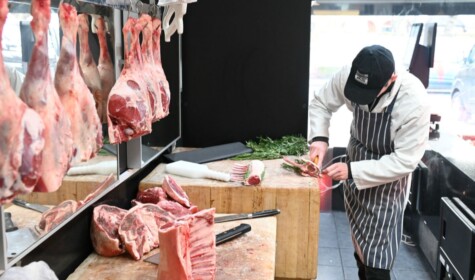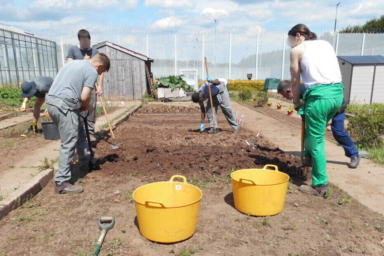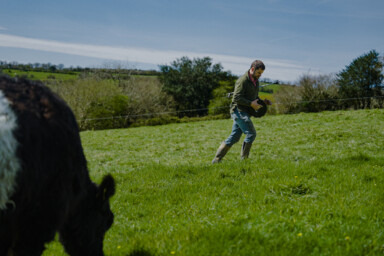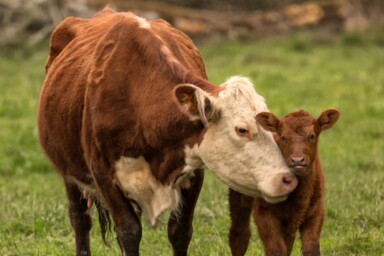SFT’s Head of Policy and Campaigns – and lead on our small abattoirs work – Megan Perry, explores the decline in people opting to work in skilled labour roles in the food sector, including slaughtering and butchery. From systemic shocks like Brexit and COVID-19 which have affected labour supply and demand, to a lack of funding for training, Megan takes a deeper look at the reasons behind this decline and what can be done to protect the future of the UK’s small abattoirs and butchers.
While many organisations are working to reconnect people with where their food comes from, educating children through farm visits and reviving an interest in food production as a viable career, there is an important part of the food chain that often gets overlooked. For sustainable livestock farming and local meat production to be viable, we need a network of abattoirs and butchers. However, the decline in people opting to work in the local meat sector and the loss of heritage and artisan skills such as butchery, has widespread implications for food security, sustainability and rural economies. This was the focus of a recent paper by the Sustainable Food Trust and the Abattoir Sector Group presented to Defra’s Small Abattoir Task and Finish Group.
The UK’s food supply chain contributes over £128 billion to the UK economy every year and provides employment for over four million people. The meat processing sector employs around 97,000 people and directly supports 50,000 farmers, with skilled butchers making up 40% of the workforce, according to the British Meat Processors Association.
However, according to the Food Standards Agency (FSA), systemic shocks such as Brexit and COVID-19 have affected labour supply and demand. The number of workers going into voluntary redundancy and early retirement doubled in recent years. In 2021, the impact of COVID was clear – there were 953,000 job vacancies in the UK, over half of them in the food and drink sector.
Estimates suggest that one in four food and drink industry workers are due to retire within the next 10 years, which amounts to over one million people leaving the industry. The BMPA has highlighted that the rise in worker losses has mainly affected skilled worker roles such as veterinarians and butchers. These roles are also some of the hardest to recruit and training is extensive and takes a long time.
Staff shortages have been a concern for some abattoirs, disrupting operational capacity and contributing to closures. National Craft Butchers’ (NCB) 2023 survey found that 20% of respondents had changed their business hours in the previous 12 months, with 22% pointing to staffing issues. For those looking to set up new abattoirs, the availability of staff can be a concern.
The average age of small abattoir operators is between 60-70. The NCB survey found that 56% of respondents do not have a succession plan, yet 50% were aged 56 or above and 26% plan to retire in the next five years.
Despite a clear need for workers in the sector, since 2019 only 22 abattoir apprentices completed their apprenticeship – that works out at about five per year, an all-time low. Only 33% of respondents to the NCB survey were currently employing an apprentice, although 82% said they would welcome one.
This problem is not helped by lack of funding, with Level 2 Butchery apprenticeships receiving £10k funding each, but only £6k available to the equivalent level in slaughtering apprenticeships. This makes it economically unviable for training providers, particularly if they must travel to remote rural abattoirs. Further, there is now only one training provider in the whole of the UK for smaller abattoirs.
“For sustainable livestock farming and local meat production to be viable, we need a network of abattoirs and butchers. However, the decline in people opting to work in the local meat sector and the loss of heritage and artisan skills such as butchery, has widespread implications for food security, sustainability and rural economies.”
There are many reasons why people are not choosing to go into a career in the slaughtering and butchery sector, not least because it can have a negative public image and gets little acknowledgement despite being an incredibly important and skilled role.
However, the decline of small abattoirs due to rising costs and a challenging regulatory environment means people are reluctant to begin a career in the sector, and family businesses are not being handed down. When we surveyed small abattoirs in Wales recently, one owner told us he had wanted to pass the business on to his son, but he felt it was not viable and his son had gone to work elsewhere.
There is also a disconnect between education, careers advice and staffing needs. With the Food Technology A-Level scrapped in 2016, there has been a lack of emphasis on food supply chain careers and training.
In our aforementioned paper on the skilled labour shortage, we reported recent conversations between the Association of Independent Meat Suppliers (AIMS) and a small group of young people under the age of 22 who are at the beginning of their further education and career paths. They highlighted how little the food sector is regarded as a viable ‘job for life’, despite living in an area dominated by food manufacturers, including two local butchers. They said the food industry was never presented as a possible career path at school. There was also an attitude that butchery was male-dominated.
However, some progress is being made. The Institute for Apprenticeships and Technical Education (IFATE) are now looking to review the slaughtering apprenticeship and are positively engaging with the sector to get their ideas and input.
Some members of the Abattoir Sector Group are also holding conversations with educational institutions and experts to explore new ideas for connecting young people with the full range of career options. This could include better connections between agricultural colleges and the processing part of the supply chain, with livestock farmers also being able to train in butchery or slaughtering, if this was something they were interested in.
Ultimately, a resilient small abattoir network is essential for the future of local meat production. And it’s the unsung heroes who work in abattoirs that are providing the vital services that so many farmers, retailers, restaurants and countless other businesses benefit from.
For more information, please see our paper.
The Sustainable Food Trust is working to connect people with the story behind their food, including promoting careers in food and farming, through our newly launched Beacon Farms Network. We are also working as part of The Agroecology Learning Collective to signpost agroecological learning opportunities (including training and apprenticeships) and support the development of new courses which fill gaps in current training provision.







